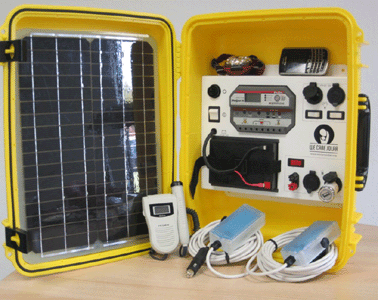Continuing on President Obama’s promise that the US will stop funding coal plants around the world, the US Treasury released guidelines that further cement the process.
Instead, Treasury’s "coal guidelines" require development banks to prioritize clean energy investments.
If global development banks like the World Bank come to the Treasury to support a new coal plant, it will back only those in the poorest countries and only if they there is no efficient or economical alternative to meet their energy needs.
But there is always an alternative to coal, especially in the poor countries without grid infrastructure. That’s where small-scale distributed renewable energy, especially solar, is especially appropriate.
Solar in a Suitcase is one of many innovative, entrepreneurial efforts to bring energy to the developing world:

In countries with more means, only coal plants that have carbon capture and sequestration will be considered.
If any coal plant is approved it will have to use the best available technology. And when banks analyze a potential project they will have to take into account the impact on health and climate pollution. That should exclude every coal plant.
"As developing economies embark on a journey towards a clean energy future, today’s announcement marks an important step in helping them reach this goal," says Lael Brainard, US Treasury Undersecretary for International Affairs.
But the Treasury guidelines do not require these banks to stop funding coal mining projects – a pretty big omission. Maybe that’s because the US still hasn’t figured out it should stop auctioning our public lands for mining.
The Treasury Department represents the US at development banks, for which it is the largest shareholder: World Bank, Asian Development Bank, African Development Bank, and European Bank for Reconstruction and Development.
Over the past five years these banks invested almost $13 billion in coal projects that are driving climate change, making this is an important signal, says Jake Schmidt, International Climate Policy Director for the Natural Resources Defense Council.
The World Bank issued guidelines shortly after the President’s Climate Change speech, which are close to those announced by Treasury today. They committed to finance coal plants only in "rare circumstances," but didn’t limit it to the poorest countries. The US Ex-Im Bank and European Bank also issued similar revisions to their lending criteria.
